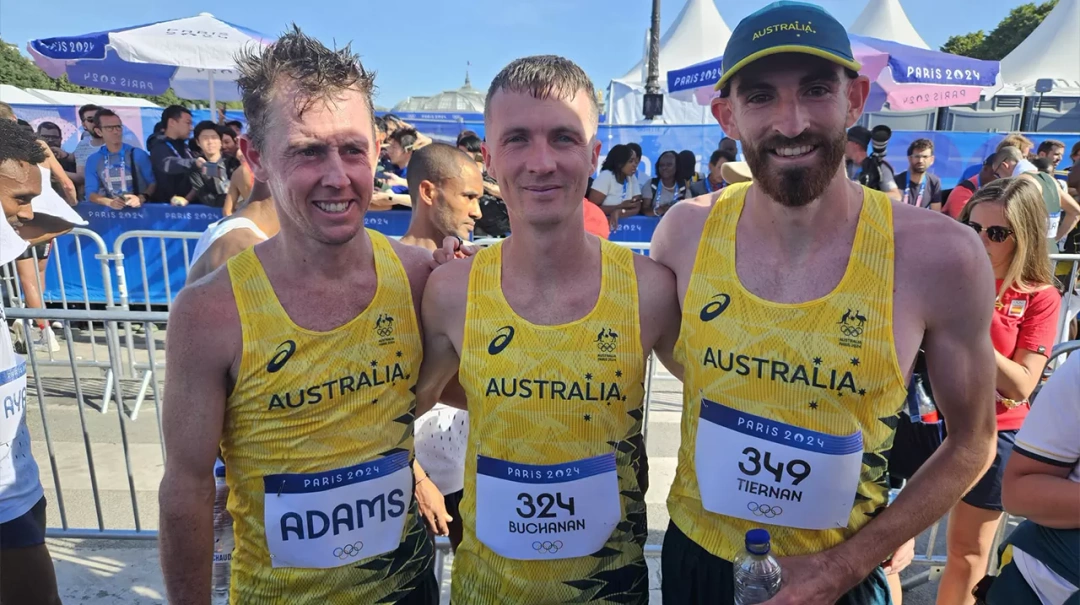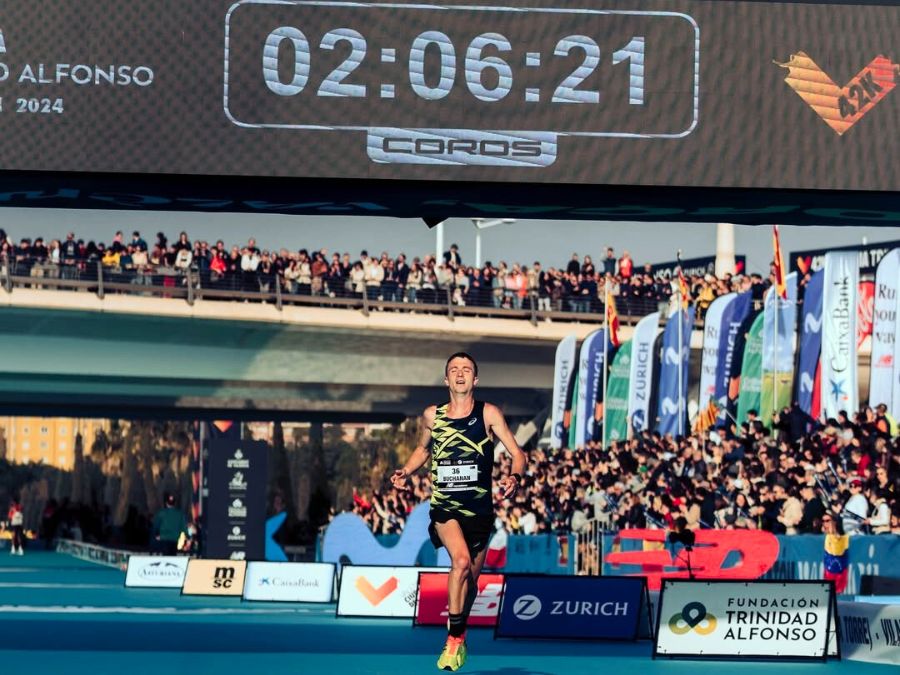Another eye-popping day in Valencia on Sunday, 1 December 2024, produced an Australian record when Andrew Buchanan crossed the line in 2:06:22. It was the first time an Australian had broken 2:07. An Australian male, we should say, now that Ruth Chepngetich with her 2:09:56 has brought such a time into the realm of the possible for women as well.
For the longest time, too, it looked we might have a new Australian women’s record. Only in the latter stages of the race did Izzy Batt-Doyle drop off the pace required to take down Sinead Diver’s 2:21:34 in Valencia two years earlier. She finished up running 2:22:59, 28 seconds faster than her previous best (in Valencia behind Diver) and third-fastest ever by an Australian behind Diver and Benita Willis’s 2:22:36.
“Holy s—t, did that just happen,” Buchanan described his reaction to the Inside Running podcast a couple of days later. “2:06? I don’t see myself as that type of person.” Nonetheless, Andrew Buchanan is precisely that kind of person now. I recalled what Chris Wardlaw said about his first meeting with Rob de Castella after ‘Deek’ had run 2:08:18 to win in Fukuoka in 1981.
“He looked pretty much the same bloke I had run with since 1974,” Wardlaw wrote in Australian Runner magazine of the encounter at Melbourne interclub, “except now he had 2:08:18 engraved on his forehead.” I expect Andy Buchanan will also look “pretty much the same” next time he drops into Bendigo’s Flora Hill track, except for the 2:06:22 engraved on his forehead.
Having declared himself not a 2:06-type of person early doors, Buchanan spent much of the remainder of the podcast explaining why he pretty much is. He has spent years preparing to become an overnight sensation. Far from “coming out of nowhere,” he has worked consistently and improved incrementally. He has put in the work for a long time, said Buchanan, and now it is paying off. If “magic” is involved, it is the magic of 2-1/2-hour Sunday long runs “for years and years.”
View this post on Instagram
Perhaps, he speculated, he had enjoyed a “bit of a sweet spot” with his 2:08:58 in Hamburg in April – “I felt there was more there then” – followed by his late call-up for the Paris Olympics (replacing Brett Robinson) which meant he didn’t build up to that race as he would for any other marathon, just went and ran it, then into Valencia. Whatever, it all came together Sunday morning, 1 December.
In pre-race comments to the Athletics Australia website, Buchanan talked about wanting to move past being “the guy from Bendigo that does a bit of running.” He’s certainly left that image behind. So far, in fact, that you’d need a telescope to see it. The signs, however, have always been there that Buchanan could do something remarkable.
Flashes of brilliance? How about consecutive triumphs in the Australian cross-country championships in 2017 and 2018 and runner-up finishes behind David McNeill in 2019 and Jack Rayner last year. Both those blokes have been Olympians and regular Australian representatives. Buchanan also made the national team for the home world cross-country championships in Bathurst last year, finishing thirty-third and a scoring member of the Australian team, which placed fourth.

Then there’s a Steve Moneghetti-like consistency to Buchanan’s pattern of racing. Most years, you can find him at the Melbourne and Gold Coast marathons (usually running in the half), at as many events on the Athletics Victoria road and cross-country winter season as fit in, and at the national cross-country championships. His winter races against the likes of Ed Marks, Haftu Strintzos, and Seth O’Donnell have warmed up the past couple of cold Victorian winters.
Now, Buchanan’s approach to the marathon has been equally methodical. A 2:12:23 debut in Hamburg in 2022, followed by a solid 2:15:40 for seventh at the Commonwealth Games in Birmingham. He was back at Hamburg the next two years, running 2:10:20 in 2023 and 2:08:58 earlier this year.
Buchanan was confident he could do better. In talking about his training to Inside Running, he mentioned sessions where he was able to hone in on the 3-minutes-per-kilometre pace he ran in Valencia and other sessions where he was able to drop down to track race pace for 1000 metres without blowing himself up.

And all this work was done while holding down a full-time teaching position most of the time and also being a key driver of the revival of top-end running, which has seen Bendigo’s regional team rise to the top of the Victorian winter competition.
The payoff came in Valencia. In terms of time, Andy Buchanan now stands ahead of Brett Robinson, Rob de Castella, Steve Moneghetti, and Derek Clayton. He may not have achieved as much as those latter three, nor quite as widely across all formats as Robinson, but he certainly stands comfortably in such company.



